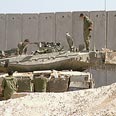
GAZA -The IDF is currently setting up a special security zone on the Egyptian border in the southern Gaza Strip, in a bid to boost security in the area ahead of the upcoming pullout.
The project aims to address weapons smuggling and recurrent firefights in what has become the most violent spot in the Gaza Strip, the Philadelphi Route.
The army was initially planning to dig a deep canal in the area, but the initiative was rejected by Attorney General Menachem Mazuz because it required that 3,000 homes in the Gaza Strip town of Rafah be destroyed.
First section of barrier completed
Subsequently, senior IDF officials, headed by Gaza Commander Aviv Kochavi, came up with a simple idea: the erection of a wall that would stretch along the route and completely separate Palestinian and Egyptian territory.
The move would turn the area into a 60-100 meter (about 200-300 feet) "security strip" controlled by IDF infantry forces. Moreover, the wall could be dismantled in the future in case circumstances change, army officials say.
"The solution we found is in fact a combination of several systems," a senior IDF southern command officer told Ynet.
The wall being built is 7-9 meters high (about 20-30 feet,) the officer said, and added the first section of the barrier has already been completed and has made patrols in the area a far less dangerous mission.
"The wall will nullify the danger of explosive devices, sniper fire, and the threat of anti-tank missiles," he said.
Sophisticated sensors
However, the army plans to leave several openings along the wall in order to allow for movement under special circumstances. In addition, the IDF is building small positions that constitute part of the wall and allow soldiers to watch over Palestinian areas.
"In this area…we'll be able to act against (arms smuggling) tunnels using a variety of means and without fear of terror threats," the officer said. "We are integrating several sophisticated systems, including various sensors, and systems that can address the tunnels, dig deep, and insert explosive material into the ground."
Accordingly, there will be no need to send forces to residential homes in Rafah in search for tunnels, he said.
'We don't count on anyone'
The senior officer admits work at the new security zone stems from the assumption that for the time being the Philadelphi route is to remain under Israeli control. However, should Egyptian forces assume security control over the area, the wall can be dismantled relatively quickly, he says.
"The Egyptians are interested in what we are doing, they are curiously staring from their positions, but beyond that there is no intervention on their part," he says.
As to the Palestinians, "with all due respect, they are still not acting in a manner that allows us to sleep well at night, and therefore the responsibility is on us," the officer says. "We don't count on anyone at this stage."
Meanwhile, the completed section of the wall has already led to a significant drop in ground-level arms smuggling attempts.
"This is obviously a serious barrier that would hurt the entire smuggling system, and whoever stands behind it understands this," the officer says. "We encountered quite a few attempts to target forces working on (construction of) the wall"
In many cases, the Palestinians send children to the wall in order to examine the area and report back, he says.
During the work on the 12-kilomter (about 7.5 miles) wall, the army has already uncovered at least five arms smuggling tunnels. Meanwhile, IDF forces uncovered and detonated two large explosive devices on the route, which were placed there in an attempt to hamper construction work.















